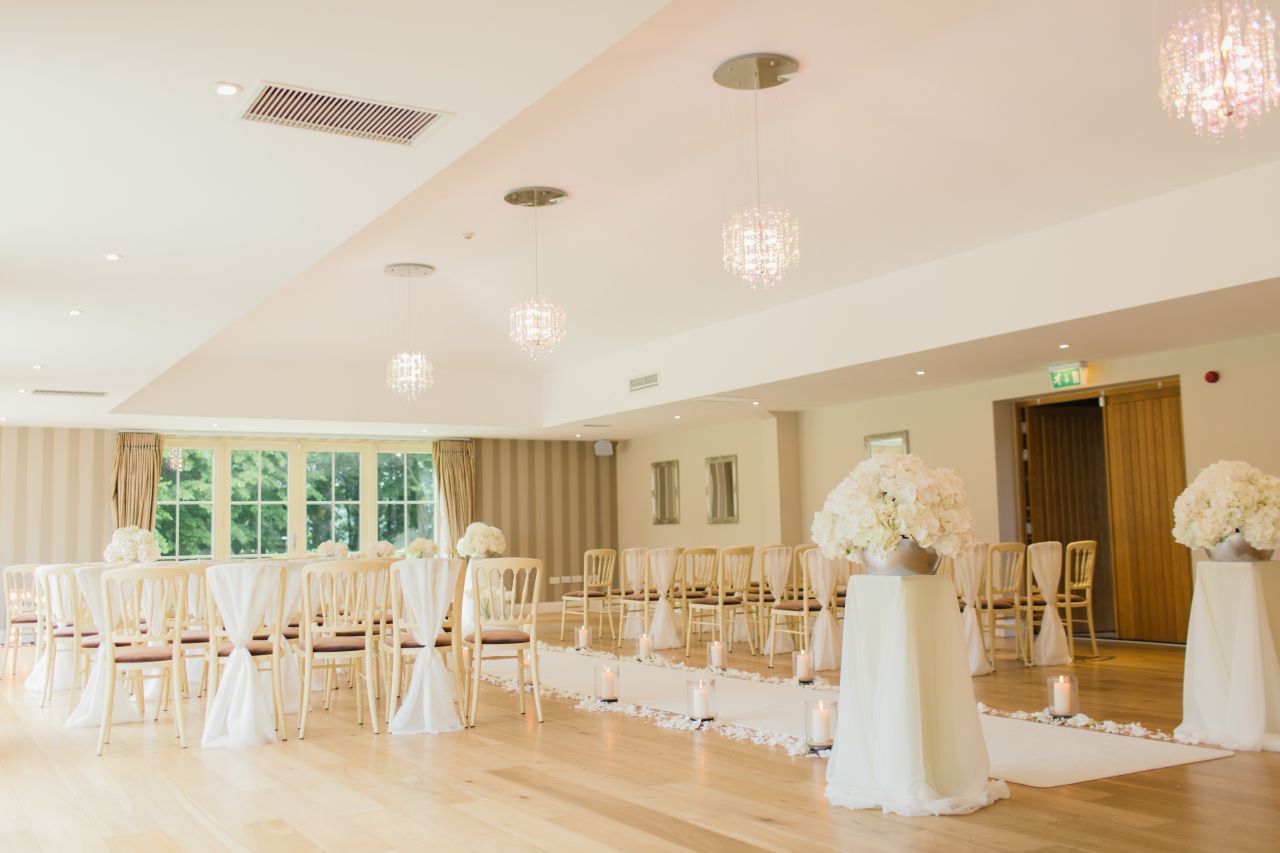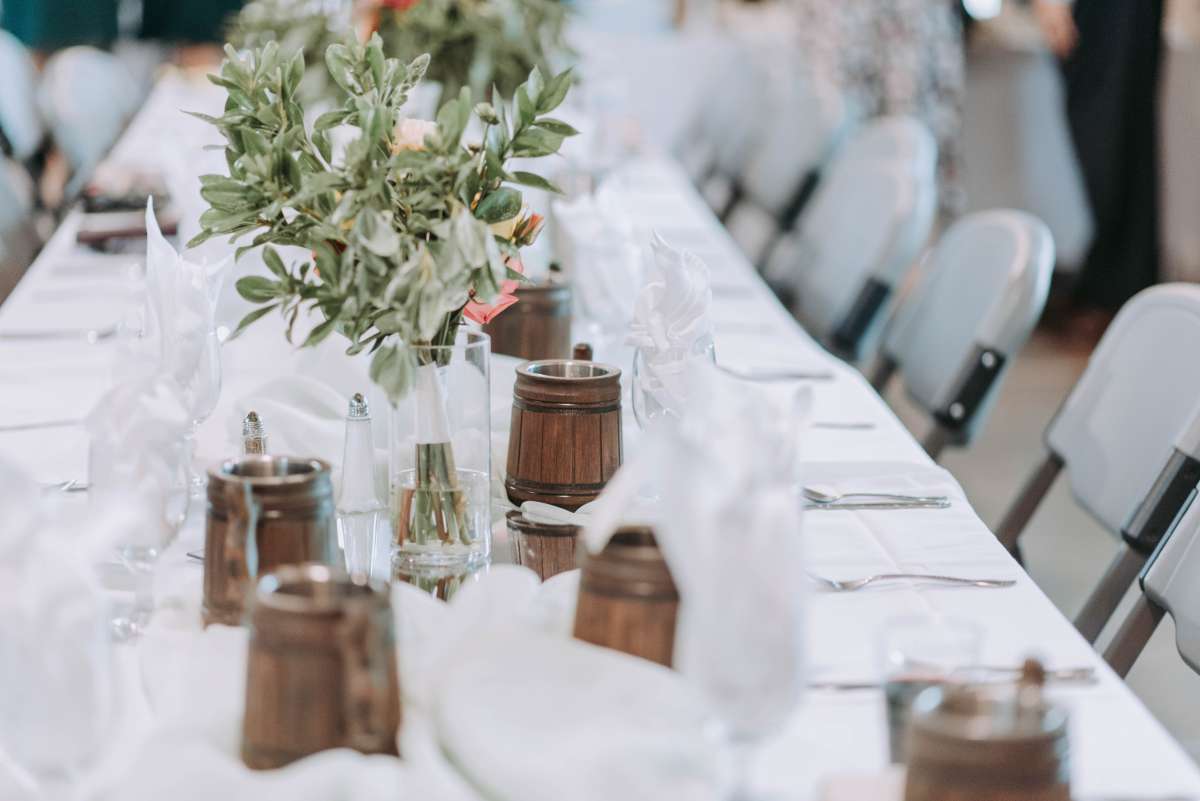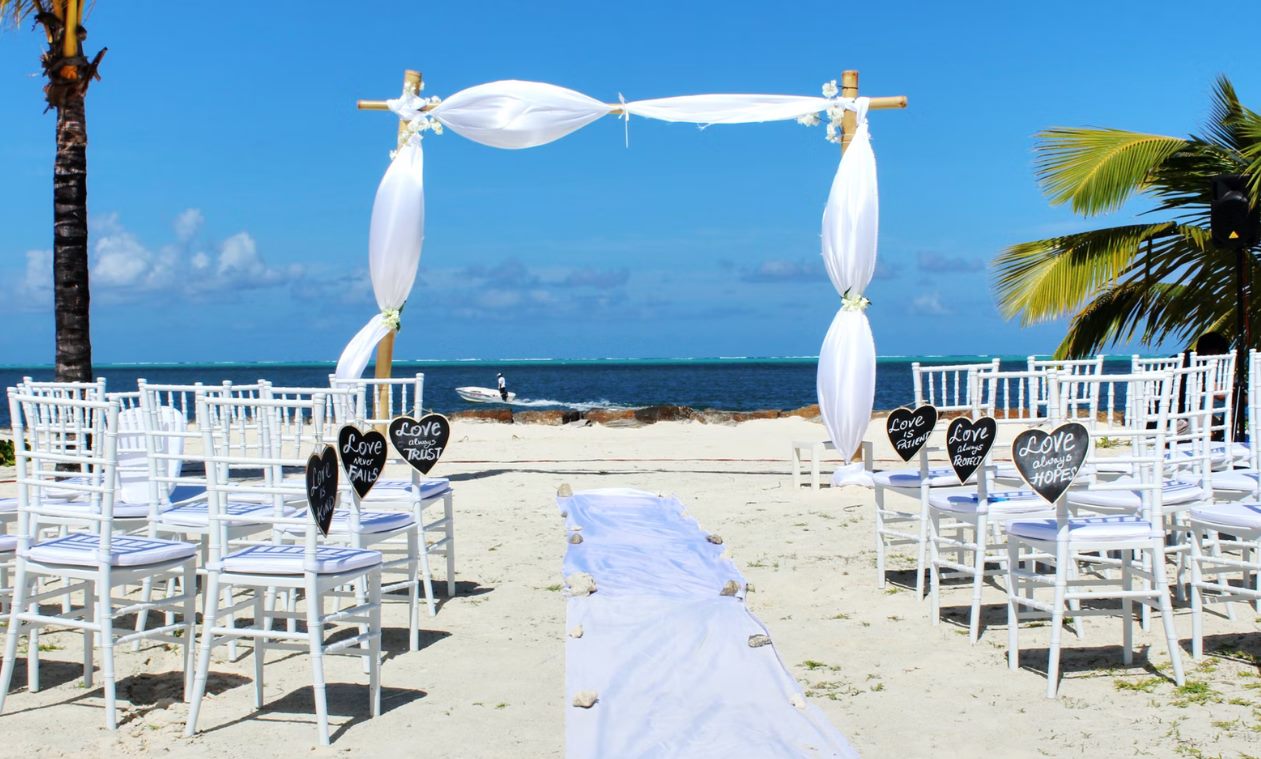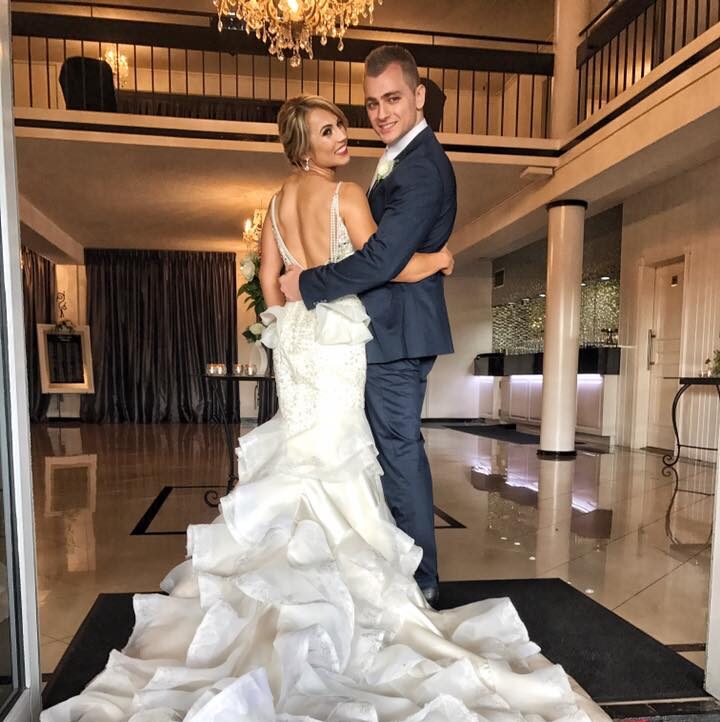Planning a small wedding isn’t just about trimming down guest lists—it’s about curating an experience that’s personal, meaningful, and memorable. My own wedding at Vogue Ballroom in 2017 was a testament to the fact that smaller celebrations can pack just as much (if not more) of an emotional punch. From the moment we said “I do” in front of just our closest friends and family, I realised how much more connected and relaxed we felt than we would have at a large affair.
One of the greatest things about small weddings is how much flexibility they offer. You can focus on what truly matters: the people, the moment, and the small details that make the day uniquely yours. Whether you’re dreaming of a quiet ceremony in a backyard or a cosy celebration at a boutique venue, this guide will walk you through everything you need to know about planning a small wedding. Let’s jump in!
The Step-by-Step Guide to Planning Your Small Wedding
Once you’ve decided that a small wedding is the way to go, the real fun begins—planning! The beauty of small weddings lies in their simplicity and flexibility, which means you don’t need to get bogged down in unnecessary details. However, you’ll still need a clear plan to keep everything on track.
Step 1 – Set Your Vision and Priorities
Before diving into logistics and vendor selections, it’s essential to take a step back and think about the type of experience you want. What vibe do you want for your wedding day? The first thing I did when planning my wedding was to think about the moments I wanted to create. Did I want a traditional ceremony, or did I want something more unique? Did I want a simple, elegant reception, or did I want to host a memorable party? Defining the vibe early on made every other decision easier.
For example, consider what’s important to you. Maybe you’ve always dreamed of a beach wedding, or you’d like to focus on family traditions. Whether you’re thinking of hosting an afternoon tea or an evening cocktail party, it’s important to pinpoint what’s truly meaningful. This will help streamline the planning process and ensure your wedding feels uniquely yours.
Step 2 – Determining Your Wedding Budget
I can’t stress enough how important it is to set your budget from the start. It’s the foundation of everything else, and it’s best to face it head-on. My advice? Be realistic about what you can afford, and don’t let the excitement of planning lead to overspending.
The beauty of a small wedding is that your budget goes further. You’re not throwing away money on extras that won’t truly matter. Focus on the key areas that will give you the most joy. For example, allocate more money for a talented photographer who can capture every special moment, or invest in high-quality catering if that’s a priority for you.

Crafting the Perfect Guest List
One of the most challenging—and sometimes emotional—parts of planning a small wedding is deciding who makes the cut. After all, a small wedding means fewer guests, and there’s no way around it: not everyone can be invited. But don’t worry, you don’t need to be ruthless. Think of this as an opportunity to focus on those who are most important to you.
How to Create an Intimate Wedding Guest List
When I planned my own wedding, I realised that having a small guest list meant I could focus on the relationships that mattered most. This wasn’t a day to invite distant cousins or colleagues from years ago—it was about celebrating with the people who truly supported our relationship.
Here’s how I approached it:
- Immediate Family and Closest Friends: My partner and I decided to keep our guest list to immediate family and a few of our closest friends. The key here is thinking about who has been there for you as a couple, not just as individuals. Who will truly celebrate with you and who will add value to your day?
- Don’t Feel Obligated: With a small wedding, you can afford to invite only the people who will make the day feel complete. Don’t feel pressured by long-lost family members or work friends who might expect an invite. This day is about you, not anyone else’s expectations.
- Be Clear and Honest: It’s important to set clear expectations early on. People will likely ask about the guest list, and it’s okay to explain that you’re keeping things small and intimate. Be kind, but firm. Most people will understand once you explain your reasoning.
One strategy that worked well for me was limiting the guest list to close family and a few friends who we couldn’t imagine celebrating without. If you want to be even more specific, you could restrict the invite list to people who have supported your relationship, from those who’ve witnessed it grow to those who’ve always had your back.
Finding the Ideal Venue for Your Small Wedding
One of the best things about planning a small wedding is the flexibility it gives you when choosing your venue. Without the pressure of accommodating hundreds of guests, you can select a space that truly reflects your style and creates the atmosphere you want for your celebration. Plus, with fewer guests, you can take advantage of unique and intimate venues.
How to Choose a Venue that Complements a Small Wedding
When choosing a venue for my small wedding, I was looking for somewhere that felt personal and intimate—a space where our 50 guests would feel like they were a part of something special. I ended up choosing a charming restaurant with a private dining room that had a relaxed, comfortable vibe. It was perfect for our needs, and it allowed us to focus on the important things—like connecting with our guests and enjoying the moment.
If you’re looking for your ideal small wedding venue, here are a few options that might spark some inspiration:
- Private Homes or Gardens: Renting a private home or garden can be a beautiful and cost-effective option. Imagine saying your vows surrounded by a lush garden or in a friend’s or family member’s beautifully decorated home. With a smaller guest list, you can truly make it your own.
- Boutique Venues: Consider smaller, boutique-style venues that are designed for intimate gatherings. Think art galleries, local wineries, or even a library or café with a beautiful setting.
- Nontraditional Locations: Small weddings offer the perfect opportunity to explore nontraditional locations. Think outdoor settings, like a park or beach, or even unique venues like a private museum or theatre.
- Destination Weddings: If you’ve always dreamed of saying “I do” in a far-flung destination, a small wedding makes this far more feasible. With fewer guests to accommodate, you can choose a location that’s meaningful to you without the logistical challenges of hosting a large event.
Selecting Vendors That Fit Your Small Wedding Vision
Choosing the right vendors is crucial to bringing your small wedding vision to life. Not all wedding vendors are suited to intimate celebrations, so it’s essential to find those who are experienced with smaller-scale events and can help you keep things personal and meaningful.
Essential Vendors for a Small Wedding
When it comes to planning a small wedding, you don’t need to hire every vendor you’d typically use for a large wedding. The beauty of a small celebration is that you can scale down the vendor list while still creating an unforgettable experience. Here’s how I approached vendor selection for my own small wedding:
- Wedding Planner/Coordinator: At first, I thought we might not need a wedding planner for a small wedding. But after a few conversations, I realised how much value a planner could add. Even though we didn’t need someone to manage every tiny detail, having a coordinator was a game-changer. They helped me keep track of timelines, managed communication with vendors, and ensured everything went smoothly. For a small wedding, I’d recommend either hiring a day-of coordinator or an experienced wedding planner who specialises in smaller events.
- Photographer: One thing I didn’t skimp on was hiring a talented photographer. For a small wedding, you want someone who understands the importance of capturing intimate moments. A professional who can tell the story of your day through beautiful, candid photos will make all the difference. I remember feeling so grateful to have a photographer who captured the quiet moments, like holding hands during the ceremony or laughing with our guests. These photos are now some of my favourites.
- Catering: Smaller weddings often mean you have more flexibility with catering. At our wedding, we opted for a food truck serving gourmet tapas. Not only was it delicious, but it was also a fun and unique experience for our guests. When choosing catering for a small wedding, think about alternatives to traditional sit-down meals, such as food trucks, buffet-style meals, or family-style service. You can even host a wine and cheese tasting or a tapas night if that’s your style.
- Entertainment: For a small wedding, you don’t need to hire a big band or DJ. Instead, you can focus on more personal entertainment that fits the intimate vibe. We hired a solo guitarist to play soft acoustic music during our ceremony and reception. It was perfect—beautiful, personal, and just the right vibe for our small celebration. If you’re looking for fun ideas, think about lawn games, a photo booth, or even a magician for some unique entertainment.
- Florist: When you’re planning a small wedding, you don’t need massive floral displays. Instead, focus on impactful floral arrangements. We chose simple but stunning arrangements using local flowers, which added colour and elegance without overwhelming the space. Look for a florist who understands your vision and can work within your budget to create stunning but minimalist pieces.
- Officiant: You may want to ask someone close to you to officiate, especially if you’re hosting an intimate ceremony. A close friend or family member can make your ceremony feel even more personal and meaningful. I opted for a dear friend to officiate our ceremony, and it was one of the most touching parts of the day. If you choose a professional officiant, make sure they understand the intimate atmosphere you’re trying to create.
- Hair and Makeup: For a small wedding, you can either hire professionals or go the DIY route, depending on your preference and budget. Personally, I decided to do my own makeup for a more relaxed vibe. But if you want to make things easier, hiring a professional is always a safe bet. If you’re going the DIY route, keep it simple—just focus on a few key beauty elements that make you feel your best.
Planning Your Intimate Ceremony and Reception
Your wedding ceremony and reception are the heart of your celebration. With a smaller guest list, you have the freedom to customise both in ways that feel truly personal and meaningful. Whether you’re aiming for a relaxed, informal vibe or a slightly more formal, elegant affair, a small wedding offers flexibility to create the perfect setting for both you and your guests.
Crafting a Personalized Ceremony for Your Small Wedding
When it comes to small weddings, the ceremony is your chance to be as creative and intimate as possible. Unlike larger weddings, where certain traditions may feel like they’re just part of a script, small weddings give you the space to truly personalise the experience.
I remember sitting down with my partner and deciding that our ceremony wouldn’t just be about the vows. We wanted it to reflect our journey together. We chose to write our own vows—something that felt right for us. Plus, we invited both of our parents to stand beside us as we exchanged vows, rather than following the traditional “bride on one side, groom on the other” format.
Here are a few ideas to make your ceremony truly yours:
- Unique Procession Ideas: Why not walk down the aisle together as a couple, or have both parents walk with you? If you’ve got pets, consider having them as part of the procession, or even as the ring bearers. The beauty of a small wedding is that you have complete freedom to decide.
- Personal Vows: Writing your own vows is a beautiful way to speak from the heart. It can be an emotional moment that feels authentic and deeply personal. If you’re struggling for words, draw inspiration from your relationship or even from favourite songs, poems, or books.
- Inclusive Readings: Small weddings allow you to involve your guests more. You could have close friends or family members read passages that are meaningful to you both—whether it’s an excerpt from a favourite poem or a short piece from your relationship’s journey.
- Unity Ceremonies: Consider adding a unique unity ceremony, such as handfasting, sand pouring, or even planting a tree together. This is a wonderful way to symbolise the joining of two lives in a way that’s uniquely significant to your love story.
Reception Ideas for a Small Wedding
When it comes to your small wedding reception, think about what will make your guests feel engaged and included in the celebration. A larger reception can sometimes feel disconnected, but with fewer people, you can foster a sense of intimacy that makes the evening feel even more special.
For our own wedding reception, we chose a cosy restaurant with a long banquet-style table so everyone could be seated together. It encouraged conversation, laughter, and a sense of connection between guests. Plus, it felt warm and communal, which was exactly what we wanted.
Here are some reception ideas to enhance the intimate vibe:
- Unique Seating Arrangements: Instead of the traditional round tables, consider seating guests at one long table or in a circle, allowing everyone to feel included and connected. This setup fosters more conversation and can make the evening feel more like a family gathering.
- Intimate Dining Experiences: For a small wedding, you don’t need to go overboard with a buffet or plated meals for every guest. Try unique dining options like a multi-course tasting menu, food stations, or even sharing platters for a more interactive dining experience. A gourmet food truck, for example, can also provide a fun, casual vibe while still offering high-quality food.
- Simple but Meaningful Entertainment: While a large wedding might have a DJ or live band, smaller weddings can opt for something more personal and relaxed. A string quartet, a solo musician, or even an acoustic guitarist can provide the perfect ambiance. We even had a close friend of ours perform a few of our favourite songs during dinner. It was intimate and deeply personal.
- Personalized Cocktails and Signature Drinks: Add a little flair to your reception with signature drinks that are unique to your wedding. Whether it’s a cocktail that represents your favourite flavour or a custom drink named after the two of you, your guests will appreciate the personal touch.
- Fun Activities: While dancing might be the highlight of some weddings, small weddings give you the opportunity to include fun, interactive activities. Think about setting up a photo booth with personalised props, lawn games like cornhole, or even karaoke for a bit of lighthearted entertainment.
Wedding Planning Timeline for a Small Wedding
When I planned my small wedding, I kept a strict timeline to ensure everything was in order without feeling overwhelmed. While you don’t need to follow an exact checklist, it helps to have an overall timeline in place so you can tick off major tasks and stay on track. Here’s a basic timeline to follow:
12-18 Months Before:
- Set Your Budget: Finalise how much you’re willing to spend and prioritise what’s most important (venue, photographer, catering, etc.).
- Choose a Date: Pick a date that works for you and your closest guests. Be flexible if needed.
6-12 Months Before:
- Book Your Venue: Once you’ve decided on a venue, secure your booking. Smaller venues may require early booking due to limited availability.
- Hire Vendors: Select your vendors—photographer, caterer, florist, and any other essentials. If you’re hiring a wedding planner, now is the time to bring them on board.
6-9 Months Before:
- Send Save-the-Dates: Inform your guests early so they can plan accordingly.
- Shop for Wedding Attire: Start looking for your wedding dress, suit, or alternative attire. Make sure to account for tailoring time.
2-4 Months Before:
- Send Invitations: Send out the official invitations. Be clear about the nature of your small, intimate wedding and the event details.
- Confirm Vendor Details: Finalise all vendor arrangements and confirm your ceremony and reception timelines.
1-2 Months Before:
- Final Guest List Confirmation: Ensure your guest list is set in stone. Reach out to guests who haven’t RSVP’d.
- Create a Seating Plan: Plan your reception seating and discuss logistics with your venue and caterers.
2-3 Weeks Before:
- Confirm Details with Vendors: Double-check all final arrangements with your vendors.
- Final Walkthrough: If possible, have a final walkthrough at your venue to go over details.
1 Week Before:
- Final Check: Ensure everything is ready to go—attire is fitting, décor is sorted, and the schedule is clear.
- Relax and Enjoy: Take time to relax with your partner before the big day arrives!
Why a Small Wedding Could Be Right for You
While some might feel the pressure to host a grand celebration, small weddings offer a unique chance to have exactly what you want without compromise. Take Sarah and James, for example. They chose to keep their wedding small and intimate, inviting only their closest 30 family members. The result? A day that felt more like a cozy gathering than a big event. They were able to spend real quality time with their guests, and even took a long walk along the beach after the ceremony, something they would never have had time for with a larger group.
Choosing a small wedding doesn’t mean you’re sacrificing excitement or elegance—it just means you’re prioritising the elements that matter to you most. It’s not about fitting into a template of what a wedding “should” look like, but about making the day as meaningful as possible for you and your partner.
While planning a small wedding certainly offers fewer challenges than a larger event, there are still logistical details that need attention to make sure everything goes smoothly. From coordinating transportation to ensuring your venue has all the necessary amenities, here’s how to handle the final touches to ensure a stress-free celebration.
Follow a Planning Timeline
One of the most important aspects of planning a small wedding is staying organised. The beauty of a small wedding is that you don’t have as many moving parts to keep track of, but there are still key tasks to complete to ensure everything goes smoothly.
Planning a small wedding allows you to focus on what truly matters—creating an intimate, personal celebration with the people who matter most. By keeping your guest list small and personalising every detail, you can ensure that your wedding day is memorable, stress-free, and completely reflective of you and your partner. From picking the right vendors to designing a simple yet elegant reception, every decision is an opportunity to make your small wedding truly special.




